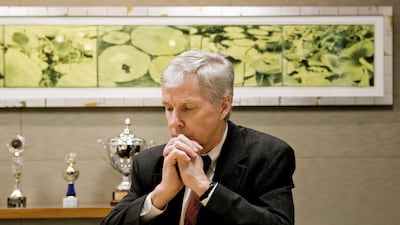As the Taliban tighten control across Afghanistan and the Pentagon scrambles to fly thousands of stranded US citizens and Afghan allies out of Kabul, veteran American diplomat Ryan Crocker is blaming successive US administrations for what he calls a “surrender” to the militant group.
Mr Crocker, who spent 40 years in the US foreign service and served as ambassador to Afghanistan between 2011 and 2012, sees Kabul's fall to the Taliban on August 15 as a culmination of mistakes by US policymakers since September 2019, when former president Donald Trump approved direct talks with the militants in Doha.
What followed in February 2020 was a total US withdrawal deal that excluded President Ashraf Ghani's government while granting broad concessions to the Taliban.
The “Taliban had a consistent position; they've been saying they're ready to talk to us, but not with our Afghan puppets [the Kabul government] in the room,” Mr Crocker said, speaking to The National from his native Washington state.
“By conceding on that point, what [former] president Trump is telling us is that these are not peace negotiations, these are surrender talks.”
He compares them to the 1973 Paris Peace Accords that officially ended America's involvement in the Vietnam War two years before the North Vietnamese victory.
The Doha deal “completely delegitimised the [now-collapsed Afghan] government and its security forces, forced it to release 5,000 Taliban prisoners who rejoined the fight, and it was absolutely predictable,” said the former ambassador, whose career included ambassadorships in Iraq, Syria, Pakistan and other countries.
When President Joe Biden took office in January, he only “made it worse,” Mr Crocker said.
“He completely embraced Mr Trump's policy, he continued with his [Afghanistan] envoy Zalmay Khalilzad, and he came to take ownership of this completely flawed process.”
By retaining Mr Khalilzad and announcing a hard timeline for withdrawal, “Mr Biden was basically saying, 'I am Donald Trump'".
Asked whether it was inevitable the US would have had to strike a deal with the Taliban eventually, given 20 years of failed efforts to defeat them and to build a self-sustaining central government, Mr Crocker disagreed.
“It's a completely false argument. When I left Afghanistan as ambassador in 2012, we had almost 100,000 troops on the ground. The Taliban controlled no provincial capitals and we engaged in a steady drawdown of our forces. So that when president Obama left office in 2017, we were a little over the 10,000 mark,” he said.
“We changed the mission of our forces during the Trump administration. They have not been in a direct combat role for several years now. We got down to around 5,000 and the Taliban still did not control a single provincial capital. We were by no means forced into this — we chose to go there.”
Maintaining the status quo by leaving a few thousand US troops was a “cheap insurance policy” at preventing another September 11-style attack on the American homeland, he said.
That attack was planned from Afghanistan by Al Qaeda, who were sheltered under the Taliban, prompting the US-led invasion.
With the Taliban now back in power, an Al Qaeda resurgence is a real threat, Mr Crocker said, while rebuffing notions the militant group will “moderate” some of its hard-line stances.




“It’s a problem from hell. We have severely degraded our ability to find out what they might be doing because of pulling out like this. We're not going to have the intelligence resources … and we have no idea what the Taliban are going to do,” he said.
The former diplomat pointed to divisions within the Taliban between fighters on the ground and officials in Doha, making the situation even harder to read.
“It's going to be a really interesting ride as they figure out their own way forward. Based on history, it’s not going to be one we'd all like.”
Mr Crocker sees the prospects of Afghanistan descending into civil war as “still a possibility” and contends “there are no good options, there are no good choices, and there are no good outcomes".
Further, Mr Biden’s handling of the crisis raises questions “on his fitness to be commander in chief,” Mr Crocker said.
“President Biden inherited a very bad hand from Trump and then made it worse.”
He added that Mr Biden “has already betrayed his own vision for his presidency".
“He said that ‘America is back’, that we will rebuild and strengthen our alliances with Nato and elsewhere, we will put the emphasis on diplomacy, not on military force. And what did he do? He unilaterally announced to complete the withdrawal without consulting with Nato. He set in motion a policy that could lead to another tidal wave of refugees hitting Europe,” Mr Crocker said.
“We have shown the world again: don’t count on us. We won't be there when you need.”


